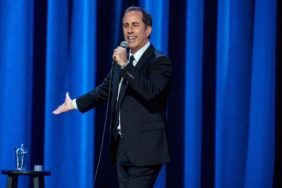Enough Said is a cute widdle puppy of a movie, the kind that makes you want to pinch the actors’ cheeks and nuzzle their noses and offer them your guest bedroom and make them breakfast in the morning and then politely ask them to please stop talking about their exes because they’re causing more harm than good but aw, they’ll learn a valuable lesson one day, and that’s Enough Said for you. It’s adorable but it has its problems.
Perhaps a little elaboration is in order. Enough Said stars Julia Louis-Dreyfus and the late James Gandolfini as two divorced persons falling in love. Dreyfus (never better) and Gandolfini (always this good) could have carried a whole movie on this flimsy non-premise alone, but director Nicole Holofcener’s script places in their way a sitcom-y contrivance: our heroine has made a new friend, played by Catherine Keener, who happens to be Gandolfini’s ex-wife. Dreyfus plays the role of confidant to Keener, who thinks her ex-husband is a loser (hence the divorce), and lets Keener’s judgments wilt what could have been her own budding romance with a likable, down-to-earth guy who – one begins to suspect – is maybe a little too good for her.

But really, those kinds of judgments are what Enough Said has on its mind. Holofcener the screenwriter creates intimate situations where her protagonists can unload their opinions about Gandolfini – some of them fair, some of them borderline cruel – and Holofcener the director brings them to life in a casual, easygoing fashion that calls attention to just how universal that kind of behavior is. Holofcener the director allows her charming cast to make these people seem lovable even when they act horribly, and Holofcener the screenwriter smartly contrasts the snap judgments made at the start of their relationship with the heroine’s experience as a divorcée.
Are these little foibles all part of Gandolfini’s personal charm and allure, or are they the types of behavior that will drive Dreyfus nuts over time? These are reasonable questions, asked by reasonable people at the start of any romantic relationship. Enough Said presents dialogue about Gandolfini’s character, always behind his back, and that dialogue feels real because sometimes it’s extremely unfair. This is what we say about people, and this film does remind us that our opinions evolve and sometimes devolve over time, but still… that’s an ugly side of everyday life, isn’t it?

It’s so wonderful to find a romantic comedy with something real to illustrate, even if it does so through a manufactured set-up. Enough Said plays sweetly, and its inviting stars have a naturally awkward chemistry. The film bolsters Dreyfus’s character with involving but (mostly) subtle subplots about her various clients, her best friends’ bickersome marriage, her daughter’s imminent departure to college and the sudden influx of misplaced attention from said daughter’s best friend. Enough Said has a richly realized protagonist, with all her strengths and weaknesses laid bare.
But here’s the problem: Gandolfini’s character is bolstered by only hearsay from his ex-wife, and his new girlfriend’s early, uninformed observations. He’s an object to be discussed. Enough Said never takes us into his private world, and while that’s rather the point of the whole film – to judge this man based only on the information that the heroine has – the audience has some inherent objectivity. We’re judging Dreyfus for knowingly deceiving him and for allowing his obviously jaded ex-wife to influence her opinions. We can see, from the distance of a movie theater, that Gandolfini’s character is mostly a wonderful human being, thanks in large part to his appealing performance, but also due to our natural tendency to be defensive about him since most of Enough Said is on the attack. So we never sympathize with the heroine’s doubts, even though in theory she has very sympathetic concerns following her failed marriage, in which small character defects escalated into unmanageably big ones.

Enough Said exerts most of its energy asking big questions that relate to the heroine and the audience themselves, about the way we treat new and old people in our lives, but the narrow focus on only one character’s perspective keeps Holofcener’s film from providing enough context to really explore those themes in a meaningful way. In short, and I apologize in advance for phrasing it this way, not nearly enough was said – by the filmmakers at least – to make either a valid point about either saying too little, or a valid point about saying too much.
Fortunately, the cast really is a genuine delight and Holofcener keeps her story interesting from start to finish, however one-sided it may be, so Enough Said is still a pretty good little yarn. It just isn’t knit together as tightly as it should be.

William Bibbiani is the editor of CraveOnline’s Film Channel and co-host of The B-Movies Podcast. Follow him on Twitter at @WilliamBibbiani.








